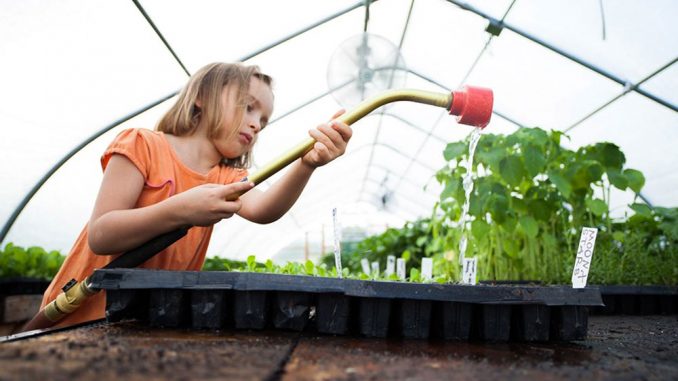
It’s like modern claymation.
Local filmmaker Richard Power Hoffman has used more than 200,000 photos to create a stop-motion feature film documenting the growth of a watermelon with two goals in mind – to captivate and to educate.
Spring Garden Pictures, a local nonprofit organization, along with film distributor BIG & Digital, has brought its first major film to four science museum theaters across the country. Most recently, the film has premiered at the Franklin Institute in both 2D and 3D, where it will run through October.
“Watermelon Magic” is a story about a young girl, Sylvie, who learns about the process of plant development by starting a watermelon garden and the value of healthily grown food. She also learns the importance of sharing when it comes time to sell the watermelons at the market.
Sylvie is played by Sylvia Green Hoffmann, the daughter of the writer, producer and director of the film, Richard Hoffmann. Richard Hoffmann is the co-founder and executive director of Spring Garden Pictures, founded in 2009.
Raised in West Philadelphia, Richard Hoffmann graduated from New York University with a bachelor of fine arts in film and ended up moving back to Philly with his wife, where he started Coyopa Productions, a film studio that created award-winning short films and documentaries.
He eventually started making more personal films, like “Fridays the Farm,” a short documentary about his family joining a community-supported agriculture farm, which gained international recognition as it was shown in places like Japan and Korea.
With his family being members of farms for nine years, Richard Hoffmann said he began to appreciate the shares of locally grown produce they would buy in their weekly drives to the farm. This, along with the familial aspects, was part of the inspiration for the creation of a fun yet educational story filmed at two local farms: Hillside Farm and Longview Farm.
“It’s definitely a big part to why I made this movie, because I want people to hopefully connect more with their food and I want kids to get to know what real food is,” Hoffmann said. “It’s good to learn about your food and where your food comes from.
While there is an emphasis on healthy eating, the film also aims to teach kids other lessons.
“It’s about the food but it’s also about the relationships that we have with our family and nature,” Tina Ratterman, president of BIG & Digital, said.
“It’s a really heartwarming movie.”
The film was funded through a Kickstarter campaign earlier in 2013 and raised close to $40,000. With a relatively small budget supporting a small team with editing and creating an original soundtrack, the film’s shooting was done with Hoffmann’s Canon 5D DSLR camera.
Hoffmann used time-lapse photography to show a sped-up progress of plants growing as well as shutter-burst and freeze frame photos to have the actors and actresses move in a staccato motion. With over 200,000 pictures taken, he was able to get a much higher resolution as well.
He hopes that these methods will get kids more interested in the science of plant life and give educators a kid-designed way to present the information rather than showing a documentary designed for adults.
“The main thing for me is to try and get kids excited first about the process and let them take it from there,” Hoffmann said. “In this film, we speed up the time so you see how cool it is how plants develop and grow, but yet it’s in a fun story that kids care about.”
“From the first time I saw it, I thought it was a very fun and creative way to present a film,” Ratterman said.
A clip of the movie was shown at the recent Philly Farm and Food Fest, where the focus was on the local food market.
“If you’re thinking and buying more locally, you’re supporting a local economy, the farmers that are growing the food,” Hoffmann said. “You’re supporting your neighbors, really.”
Albert Hong can be reached at albert.hong@temple.edu.


Be the first to comment